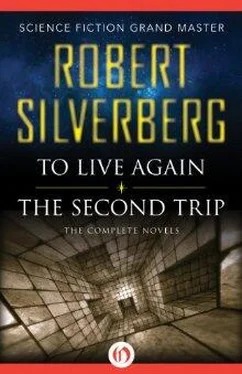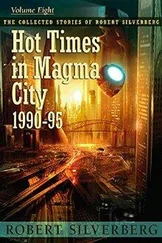Hamlin.
Making his move.
Time fell to stasis, so that Macy could perceive each phase of the conquest in a leisurely, detached way. Hamlin, having collected his strength for some days now, was taking advantage of the hallway battle, of Macy’s full absorption in his difficulties, to seize the motor centers of their shared brain. Ripping out connections with both hands, replugging them under his own administration. Macy was tumbling through a timeless abyss. And Hamlin steadily and efficiently consummating what must have been a carefully planned takeover. Right leg. Left leg. Right arm. Left arm. Paralysis setting in, an unexpected summer freeze. Macy sinking and sinking and sinking. No way to defend himself; he had left his flank unguarded, and the enemy was pouring over the palisade. Down. Down. Down. Very cold now, very still. Where was Gomez’ surveillance? Right hand to left shoulder. Left hand to right shoulder. Extreme danger. Hah. Much good that would be. Macy realized that he and Gomez had completely forgotten to devise one important signal, the one that said, Help, he’s taking me over! Not that anybody was here to help him. Right hand to left shoulder. Left hand to right shoulder. Extreme danger. Down. Down. He has me.
He was submerged in a sea of smooth green glass. Wholly engulfed, unable to break through to the surface: above his head a solid sheet, impermeable, infrangible, sealing him away from the air. Choking, lungs bursting, head throbbing. A dull pounding sensation in both his calves; swelling of the toes. Below his dangling feet a fathomless abyss, dark, dense. From far overhead came faint greenish-gold strands of light. Blurred, indistinct images of the upper world. All perceptions refracted and distorted and transformed. His hands pushing desperately at the glassy layer above him. Which would not yield. Oh, God, I must be in hell! How can I breathe? How did he do this to me? How will I get out of here? I must be sinking. Slowly down and down. Toothy fish to pick my bones. He could feel the surging of the currents, rivers in the sea buffeting him as they swept past. He shivered. Terror invaded him. So this is it. He has me. He has me. I am within him.
Macy felt a sharp pang of loss, of displacement It had been so good living in the world. The sunlight, the people, laughter, even the uncertainties, the tensions. To be alive, at least. And then to be overthrown, cast down, evicted, disinherited. He took it all away from me when I wasn’t ready to go. It wasn’t fair. And now? The pain of this place. The gasping. The choking. The fear.
But he survived the first lurch of terror and discovered that there was no second one. He grew calm. Gradually Macy refined and clarified his awareness of his new condition. He realized that although he could not reach the air, neither would he sink any deeper, nor was the feeling that he was about to drown to be taken literally. In fact this was no sea. All the marine imagery, he understood now, was purely metaphorical. He was indeed submerged, he did indeed dangle between somewhere and somewhere, but he had become a mere electrochemical network spread thinly through the recesses of what he was forced at this stage to regard as the brain of Nat Hamlin. Hamlin was in charge, on top. Macy occupied some indefinable cranny or series of crannies. He could not see. He could not feel. He could not speak. He could not hear. He could not move. He was nothing but an abstraction, a disembodied identity. Whether he could properly be said to exist at all was questionable.
Now that the first shock was past, he was startled that the loss of his independence brought no despair. Surprise, yes. Irritation and annoyance, yes. (How slickly Hamlin had outmaneuvered him!) Dismay, yes. (How strange it is to be trapped in here. How claustrophobic. Will I ever be able to get out again?) But not despair. Not even fear. Hamlin had once been in this very predicament himself, had he not, and he had endured it and mastered it and escaped. Then why not I?
There was of course a great temptation to accept the situation complacently and passively. Telling oneself that one had never been entitled to a real existence anyway. That it would be best for everyone concerned, now that the upheaval of selves had come about, if he sat tight in this womblike place. Placidly letting Hamlin have the body to which he held the original birthright. But the temptation did not tempt Macy greatly. Easy though it might be to take up a vegetable existence, he preferred a more active life. A body of his own. The brief taste of living that he had had left him hungry for more.
I never really began, after all, he thought. Just a few weeks on my own away from the Center. With him bothering me most of that. And now this. I’ll fight back. I’ll push him out as he pushed me. I may not have been born, but I was real and I wish to return to existence.
Patiently he sought to examine his available options. Was it possible to establish sensory input? Let us see. Let us muster our powers of concentration. If we gather our energy—so—and direct it purposefully in a single direction—so—do we make contact with anything? No. No. Glassy darkness is all. And yet. Now. What do we have here? A node, a handle. Which we can seize. To which we can apply a subtle interior pressure. Yes! And we perceive. The inward-rushing flood of sensation. But what do we perceive? Our surroundings.
Yes, just as Hamlin said, you arrive at a kind of percept-surrogate image of the brain you’re in. If only you had paid more attention, at the Center, when they were trying to teach you a little structural anatomy so that they could explain what they’d been doing to your head. The synaptic vesicles. The synaptic cleft. Dendritic spine. Axon terminal. Organelles, filaments, and tubules. Neural mitochondria. Corpus callosum. Anterior commissure. Limbic cortex. Centrencephalic system. Words. Words. This baffling torrent of referentless nouns. But somehow a little comprehension slides through. You poke around, you insinuate yourself, you learn a thing or two. And the darkness clears.
Macy sent a tendril of himself down a narrow moist corridor and found, at the end of it, a pulsing pink wall on which a golden honeycomb-textured plate was mounted. The tip of the tendril went into one of the apertures of the honeycomb and a tiny explosion of light resulted. Progress, no? Now we subdivide the tendril, and poke one end of it in here, and one in here, and one in here. Flash flash and flash. Presto jingo, we get an input! A bright cluster of sensory data. As yet what comes in is undifferentiated; it might be sight, sound, touch, smell, anything. But at least there is an input. We will continue. Macy tirelessly probing. Seeking out new avenues of exploration. More honeycombs; more subdividing tendrils slipping into slots; more bursts of light.
Will any sense ever come out of this? You are trying to tap a television image, and you can succeed in making contact only with widely scattered phosphors, a dot here and a dot there. Little spiky blurts of information, not enough for comprehension. Not yet. But no one is rushing you. You have no sense of the passage of time. Take an hour, a minute, a century, a year. Sooner or later you’ll have a good hookup. It’s just a matter of—what was that? A flash of coherence! Here and gone, but it was a total image. Audio? Visual? You still can’t tell, but you know that you had all the information, even if you weren’t able to interpret it. It was, say, a complete sentence, subject predicate adverbs adjectives expletives articles punctuation dependent clauses, which Hamlin read or heard or spoke out loud. It was, say, a full sweep of Hamlin’s optical reservoir, taking in the entire visual input of a fiftieth of a second. It was, say, a spear of abstract thought crossing Hamlin’s consciousness from northwest to southeast. Let us now relate such random rootless inputs to our own bank of data. So that we may evaluate. So that we may interpret. So that we can tell sight from sound from cognition. Thus. And thus. We string our telegraph wire across miles and miles of desert and at last it brings us messages.
Читать дальше












